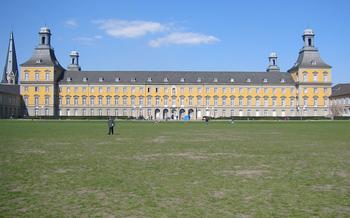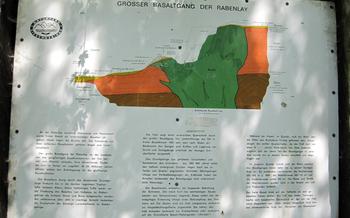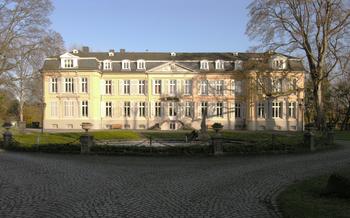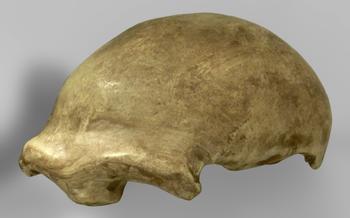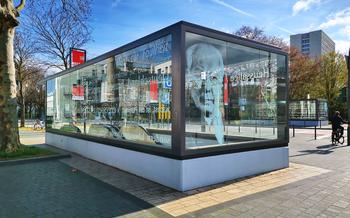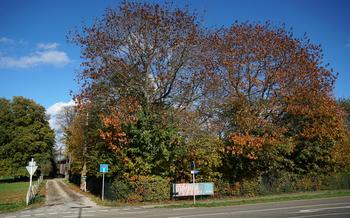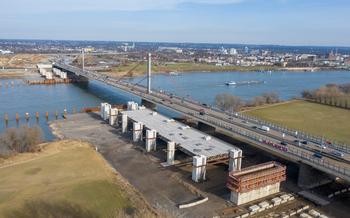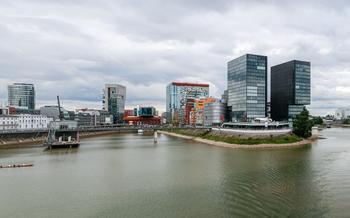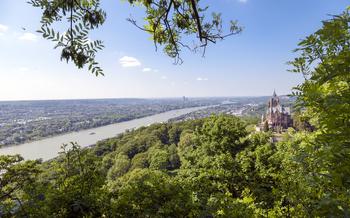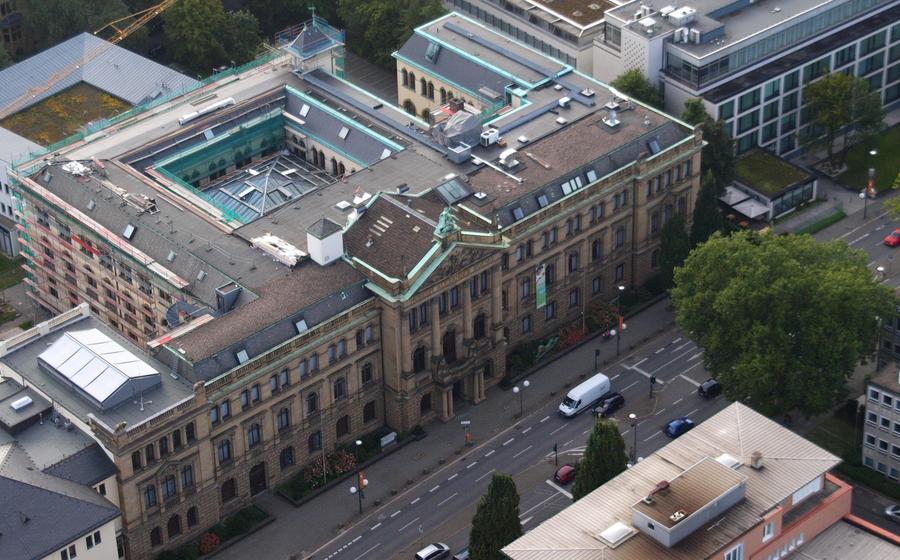
Museum Koenig
- Museum Koenig: A World-Renowned Natural History Museum in Bonn
- Exploring the Wonders of Nature at Museum Koenig
- The Unique Collection of Fossils at Museum Koenig
- Uncovering the Secrets of Human Evolution at Museum Koenig
- The Fascinating World of Insects at Museum Koenig
- Interactive Exhibits for a Fun and Educational Experience
- Museum Koenig: A Center for Scientific Research
- Guided Tours for an In-Depth Exploration
- The Museum Shop: Unique Souvenirs and Gifts
- Museum Koenig's Commitment to Conservation
- Accessibility and Facilities at Museum Koenig
- Planning Your Visit to Museum Koenig
- Must-See Exhibits at Museum Koenig
- Insider Tip: Behind-the-Scenes Tour
Museum Koenig: A World-Renowned Natural History Museum in Bonn
Nestled in the heart of Bonn, Germany, the Museum Koenig stands as a testament to the wonders of the natural world. Founded in 1934 and named after Alexander Koenig, a renowned German zoologist, this world-class institution has captivated visitors for decades with its awe-inspiring collections, groundbreaking scientific research, and engaging educational programs.
History: The Museum Koenig traces its roots back to 1853 when it was established as a university zoological museum. Over the years, the museum's collection grew exponentially, necessitating a move to its current location in 193Today, the museum boasts over 16 million specimens, making it one of the largest natural history museums in Germany.
Architecture: The Museum Koenig's striking architecture is a sight to behold. Designed by architect Heinrich Bartmann, the building features a monumental Neoclassical facade complemented by modern glass and steel elements. The spacious interior offers ample room for the museum's vast collection, with state-of-the-art exhibition halls, research laboratories, and storage facilities.
Collections: The Museum Koenig houses a treasure trove of natural history specimens, spanning the realms of zoology, paleontology, and botany. Its collection of mammals, birds, reptiles, amphibians, and fish is particularly impressive, with many rare and endangered species represented. The museum also boasts an extensive fossil collection, including dinosaur skeletons, Ice Age mammals, and fossil plants.
Scientific Research: The Museum Koenig is not just a museum; it's also a hub for scientific research. With a team of renowned scientists and researchers, the museum conducts cutting-edge studies in paleontology, zoology, and botany. Their work contributes to our understanding of the evolution of life, biodiversity conservation, and the impact of climate change on ecosystems.
Exploring the Wonders of Nature at Museum Koenig
Biodiversity Galleries:
The biodiversity galleries at Museum Koenig offer a captivating journey through the incredible diversity of life on Earth. In these galleries, visitors can marvel at the vibrant colors and intricate forms of birds, insects, reptiles, amphibians, fish, and mammals from across the globe. Life-size dioramas and interactive displays showcase the diverse habitats these creatures call home, from lush rainforests to arid deserts and icy tundras. By highlighting the interconnectedness of all living things, these galleries foster a deep appreciation for the beauty and complexity of the natural world.
Evolutionary History Exhibits:
Museum Koenig's evolutionary history exhibits provide a captivating glimpse into the incredible journey of life's evolution over billions of years. Through stunning fossil displays, visitors can trace the origins and diversification of major animal and plant groups. Interactive exhibits allow visitors to explore the mechanisms of evolution, such as natural selection and adaptation, and gain a deeper understanding of how species have changed over time. From the humble beginnings of single-celled organisms to the emergence of complex and diverse life forms, these exhibits offer a comprehensive and engaging narrative of life's grand evolutionary story.
Interactive Displays:
Museum Koenig is renowned for its innovative and engaging interactive displays that bring the wonders of nature to life. Touchscreens, virtual reality experiences, and hands-on exhibits invite visitors to actively engage with the museum's collections and explore scientific concepts in a fun and interactive way. Whether it's virtually exploring the depths of the ocean or examining the microscopic world of insects, these interactive displays captivate visitors of all ages and make learning about natural history an unforgettable experience.
Temporary Exhibitions:
In addition to its permanent exhibits, Museum Koenig regularly hosts temporary exhibitions that showcase cutting-edge research and explore specific themes in natural history. These exhibitions often feature rare and unique specimens, interactive installations, and thought-provoking displays that challenge visitors' perspectives on the natural world. From the latest discoveries in paleontology to the intricate relationships between plants and animals, these temporary exhibitions offer a fresh and dynamic dimension to the museum's offerings.
The Unique Collection of Fossils at Museum Koenig
Museum Koenig boasts an extensive collection of fossils that provide a glimpse into the Earth's rich history of life. The star attractions are the impressive dinosaur skeletons, including a towering Tyrannosaurus rex and the massive Triceratops. These majestic creatures captivate visitors with their size and grandeur, evoking a sense of awe and wonder.
Moving beyond the dinosaurs, the museum also showcases an array of Ice Age mammals such as the woolly mammoth and the saber-toothed tiger. These life-like exhibits transport visitors back to a time when these magnificent creatures roamed the Earth.
The museum's fossil collection extends to the plant kingdom as well. Visitors can marvel at the intricate details preserved in fossilized leaves and petrified wood, providing insights into the diverse flora that existed millions of years ago.
Finally, the Micropaleontology collection reveals the hidden world of tiny fossils, such as foraminifera and ostracods. These microscopic organisms offer valuable clues about past climates and environments.
Uncovering the Secrets of Human Evolution at Museum Koenig
Museum Koenig's human evolution exhibits take visitors on a captivating journey through the story of our ancestors. The museum houses an impressive collection of Neanderthal fossils, including the famous Neanderthal family discovered in the Neander Valley near Düsseldorf. These fossils provide valuable insights into the physical characteristics, behavior, and lifestyle of these early humans.
In addition to Neanderthal remains, the museum also showcases a variety of artifacts and fossils related to Cro-Magnon, the anatomically modern humans who appeared in Europe around 40,000 years ago. These artifacts include stone tools, jewelry, and artwork, offering glimpses into the technological and cultural development of our species.
The exhibits also explore the origins of modern humans and the factors that contributed to our evolutionary success. Visitors can learn about the migration patterns of early humans, the development of language, and the emergence of agriculture. Interactive displays and multimedia presentations bring the story of human evolution to life, making it both engaging and educational for visitors of all ages.
The Fascinating World of Insects at Museum Koenig
Museum Koenig's entomology collection is a treasure trove of knowledge and fascination for those interested in the tiny creatures that play a crucial role in our ecosystem. With over 20 million specimens representing more than 100,000 species, the museum houses one of the most comprehensive insect collections in the world.
Explore the incredible diversity of insects through interactive displays that showcase their unique adaptations, behaviors, and habitats. Learn about the intricate relationships between insects and plants, and their essential role in pollination and seed dispersal.
Discover the secrets of insect communication, from the mesmerizing dances of bees to the chirping songs of crickets. Dive into the world of insect behavior, from the social organization of ants and termites to the hunting strategies of dragonflies and wasps.
Gain insights into the vital role of insects in our food chain and the broader ecosystem. Understand the threats facing insects, such as habitat loss, climate change, and pesticides, and learn about the conservation efforts underway to protect these essential creatures.
Whether you're an amateur entomologist or simply curious about the world of insects, Museum Koenig's entomology collection offers an unforgettable journey into the fascinating realm of these tiny wonders.
Interactive Exhibits for a Fun and Educational Experience
Museum Koenig offers a wealth of interactive exhibits that make learning about natural history fun and engaging for visitors of all ages. Touch and feel exhibits allow visitors to experience the textures and shapes of various specimens, including fossils, animal pelts, and plant leaves. Virtual reality experiences transport visitors to different habitats and ecosystems, where they can observe animals in their natural environments. Multimedia presentations provide in-depth information on various topics, accompanied by captivating visuals and animations. Children's workshops offer hands-on activities and educational games that teach kids about the wonders of nature in a playful way.
Museum Koenig: A Center for Scientific Research
Museum Koenig is not only a fascinating destination for visitors, but also a renowned center for scientific research. The museum's scientists conduct a wide range of research projects in paleontology, zoology, botany, and conservation.
Paleontological Research Paleontologists at Museum Koenig study the history of life on Earth through the analysis of fossils. They have made significant contributions to our understanding of dinosaur evolution, the extinction of the Neanderthals, and the origins of modern humans.
Zoological Research Zoologists at Museum Koenig study the diversity, behavior, and conservation of animals. Their research focuses on insects, birds, mammals, and reptiles. They conduct field studies in various ecosystems around the world to gain insights into animal behavior and ecology.
Botanical Research Botanists at Museum Koenig study the diversity, evolution, and conservation of plants. They conduct research on plant anatomy, physiology, and ecology. Their work contributes to our understanding of plant-insect interactions, the effects of climate change on plant communities, and the development of sustainable plant conservation strategies.
Conservation Research Conservation biologists at Museum Koenig conduct research on endangered species and their habitats. They study the threats facing these species and develop conservation strategies to protect them. Their research focuses on species such as the Sumatran tiger, the African elephant, and the giant panda.
Guided Tours for an In-Depth Exploration
Museum Koenig offers a range of guided tours to enhance your visit and delve deeper into the fascinating world of natural history. Led by knowledgeable and passionate guides, these tours provide an in-depth exploration of the museum's collections, exhibitions, and research activities.
Public Guided Tours:
Join a public guided tour to gain insights into the museum's highlights and discover hidden treasures. These tours are offered regularly throughout the day and are suitable for visitors of all ages.
School Group Tours:
Museum Koenig welcomes school groups of all levels, providing tailored tours that align with their curriculum. Educators can choose from a variety of topics, including dinosaurs, evolution, insects, and human origins.
Specialized Tours for Adults:
For those seeking a more in-depth exploration, specialized tours for adults delve into specific areas of interest, such as paleontology, zoology, botany, and conservation. These tours are led by experts in the field and offer a unique opportunity to learn from their insights.
Personalized Tours:
For a truly customized experience, visitors can arrange for a personalized tour tailored to their specific interests and needs. Whether you are a group of friends, a family, or a solo traveler, the museum's staff will work with you to create a tour that meets your requirements.
The Museum Shop: Unique Souvenirs and Gifts
The Museum Koenig shop is a treasure trove of unique souvenirs and gifts for nature enthusiasts of all ages. From fossil replicas to insect specimens, science-themed books to educational toys, the shop offers a wide range of items that are both educational and entertaining.
Fossil enthusiasts can choose from a variety of dinosaur bone replicas, including the popular Tyrannosaurus rex and Triceratops. There are also replicas of other prehistoric creatures such as saber-toothed tigers, mammoths, and giant sloths.
For those interested in insects, the shop offers a variety of insect specimens, both live and preserved. Visitors can purchase beetles, butterflies, spiders, and other insects to take home and observe. There are also a number of books and field guides on insects available for purchase.
The shop also has a wide selection of science-themed books for both adults and children. These books cover a variety of topics, from the history of life on Earth to the latest discoveries in paleontology and zoology.
For younger visitors, the shop offers a variety of educational toys and games. These toys are designed to help children learn about the natural world in a fun and engaging way. There are puzzles, board games, and even build-your-own dinosaur kits.
Whether you're looking for a souvenir to remember your visit to Museum Koenig or a gift for a nature lover in your life, you're sure to find something special in the museum shop.
Museum Koenig's Commitment to Conservation
As a world-renowned natural history museum, Museum Koenig recognizes the urgent need to protect our planet's biodiversity. The museum is deeply committed to conservation efforts through various initiatives and programs.
One of the key areas of focus is endangered species research. Museum scientists actively study and monitor threatened species, providing valuable data and insights for conservation planning and management. They collaborate with conservation organizations and government agencies to implement conservation strategies and protect habitats.
Museum Koenig also plays a crucial role in conservation education. Through interactive exhibits, workshops, lectures, and outreach programs, the museum raises awareness about conservation issues and inspires visitors to take action. They educate the public about the importance of biodiversity, the threats facing wildlife, and the role of individuals in protecting the environment.
Furthermore, the museum supports species protection initiatives and collaborates with conservation organizations around the world. They actively participate in conservation projects, such as breeding programs for endangered species, habitat restoration, and anti-poaching efforts.
By combining scientific research, education, and practical conservation initiatives, Museum Koenig contributes significantly to the global efforts to protect our planet's biodiversity and ensure a sustainable future for all.
Accessibility and Facilities at Museum Koenig
Museum Koenig is committed to providing an accessible and welcoming environment for all visitors. The museum is wheelchair accessible, with ramps and elevators connecting all floors. Stroller parking is available at the entrance, and restrooms and baby changing facilities are located throughout the museum. A cafeteria and vending machines provide refreshments for visitors, and a gift shop offers a variety of souvenirs and educational items. For visitors with disabilities, the museum offers guided tours and workshops that are tailored to their specific needs. These tours and workshops provide an opportunity for visitors to learn about the museum's collections and research in a fun and engaging way.
Planning Your Visit to Museum Koenig
Museum Koenig is conveniently located in the heart of Bonn, within walking distance of the city center and the Rhine River. The address is Adenauerallee 160, 53113 Bonn, Germany. It is easily accessible by public transportation, with several bus and tram lines stopping nearby. For those arriving by car, there is limited parking available at the museum, but there are also several public parking garages in the vicinity.
The museum is open from Tuesday to Sunday, with hours varying depending on the season. During the summer months (April to October), it is open from 9 am to 6 pm, while during the winter months (November to March), it is open from 9 am to 5 pm. It is closed on Mondays and on public holidays.
Admission fees vary depending on the type of ticket and whether or not you are a member of the museum. Standard admission for adults is €9, while reduced admission for students, seniors, and disabled visitors is €Children under 6 years old are admitted free of charge. Family tickets and group discounts are also available.
If you are planning to visit the museum with a group, it is advisable to make a reservation in advance, especially for school groups or large tour groups. Reservations can be made online or by phone. Online ticketing is also available, which allows you to purchase tickets in advance and avoid lines at the ticket counter.
The museum offers a variety of special offers and discounts throughout the year, such as free admission on certain days or discounted rates for families and groups. It is worth checking the museum's website or social media pages for up-to-date information on special offers and events.
Must-See Exhibits at Museum Koenig
Among the many fascinating exhibits at Museum Koenig, several stand out as must-sees for any visitor. The Tyrannosaurus Rex skeleton is a awe-inspiring sight, towering over visitors with its massive skull and powerful jaws. It is one of the most complete T-Rex skeletons in the world, and its presence in the museum is testament to the institution's world-class paleontological collection.
Another must-see exhibit is the Neanderthal Family. This life-sized recreation of a Neanderthal family group provides a glimpse into the lives of these ancient hominids. The exhibit features realistic sculptures of Neanderthals engaged in various activities, such as hunting, gathering, and caring for their young.
For those interested in entomology, the Giant Insects Exhibit is a must-see. This exhibit features oversized models of various insects, such as a giant grasshopper, a praying mantis, and a stick insect. These models are both fascinating and educational, providing insights into the diversity and biology of these important creatures.
Finally, the Evolution of Life Gallery is a must-see for anyone interested in the history of life on Earth. This gallery traces the evolution of life from its earliest origins to the present day. It features fossils, models, and interactive displays that illustrate the incredible diversity and interconnectedness of life on Earth.
Insider Tip: Behind-the-Scenes Tour
For an unforgettable and exclusive experience, take advantage of the behind-the-scenes tour at Museum Koenig. This unique opportunity allows visitors to go beyond the public exhibits and delve into the hidden treasures and workings of the museum.
Led by an experienced guide, you'll gain exclusive access to restricted areas, such as the museum's collection storage facilities, preparation labs, and research laboratories. Learn about the fascinating processes involved in specimen preparation, conservation, and scientific research.
See firsthand the museum's vast collection of specimens, including fossils, insects, and plant specimens that are not on public display. Get up close to rare and delicate artifacts, and hear captivating stories about their discovery and significance.
The behind-the-scenes tour offers a unique perspective on the museum's work and provides a deeper understanding of the world of natural history research. It's an exceptional opportunity for anyone interested in paleontology, zoology, botany, or simply wants to experience the museum from a different angle.
Remember to book your behind-the-scenes tour in advance to secure your spot. Limited spaces are available, and tours are often in high demand. Don't miss this chance to explore the hidden wonders of Museum Koenig and gain exclusive insights into the world of natural history.
